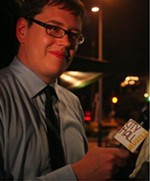Parsing the Permits
How many is just right?
By Wells Dunbar, Fri., June 9, 2006

When the Yellow Cab/Roy's Taxi purchase proposal first surfaced, it was for a flat buyout of the franchise and the 155 permits owned by Roy's. Following the Urban Transportation Committee's recommendation of denial, Council Member Betty Dunkerley offered some amendments, hoping to please those in opposition. If the definition of a successful compromise is that it enrages all parties, thus far Dunkerley's succeeded very well.
Unlike other businesses, taxicabs – as common public carriers – are regulated by the city, to protect the public and foster competition. That means when a particular franchise – in this case Roy's – wants to get out of the business, that creates a ripple effect in the local industry, necessitating city oversight. Technically, to approve the sale, the city must repeal Roy's franchise while amending Yellow's. Under Dunkerley's motion, to ease the transition, the 155 transferred Roy's cabs would have their conversion costs paid by Yellow. It's "basically a paint job, decals, top-lights, meters, radios – stuff like that," says Yellow president Jim Connolly. Additionally, Yellow would be ineligible for any additional new permits over the next four years.
The central controversy concerning Dunkerley's compromise – aside from allowing the transfer at all – is the creation of 75 new taxi permits. Twenty would go to Austin Cab Company, giving another option to drivers reluctant to work for Yellow. The remaining 55 would be set aside for a new taxi franchise. Some opponents say the number of permits designated for Austin Cab appears arbitrary, while opposition against the 75 new permits is twofold: It's too many, and it's not enough.
While it might seem contradictory, that's Zak Foto's position. A mechanic and entrepreneur, Foto got into the business of servicing taxis and gradually began leasing cabs to drivers unable to buy their own. He has parlayed his work into his own auto shop on Airport, where he primarily services taxis. Many of the cars he sees are those he owns – his 16 leased Roy's cabs, and 38 with Austin Cab Company. Combined, they represent his own makeshift fleet, called Capital City Cab Company.
Along with Lone Star Cab Company, which applied for and was denied a franchise three years ago (because too many cabs were already on the streets), and proposed driver-owned cab co-op Longhorn Cab, Foto's company is competing for the new permits. Their applications have all been submitted to the city's Public Works department, where they'll be vetted before going to the Urban Transportation Commission this month, then City Council for approval. If any or all of the applicants are found to be equally qualified, a lottery determines the winner. Foto and the competing applicants are eager for approval, but they fear the allotment isn't high enough. Citing the enormous overhead costs of launching a new franchise – radio dispatch, service costs, insurance and more – he says 55 permits is far too few to turn a profit. Without sufficient permits, Foto fears a new franchise might fold in a matter of months. (They wouldn't be permitted to sell to Yellow in the case of closure, however – Dunkerley's proposal creates a moratorium on selling permits to any company controlling 60% or more of the market.)
Conversely, the city is offering most of the new permits as a hedge against future growth. Of those 75, 11 are directly in response to current growth, the rough math being one new cab for every 1,200 new city residents, among other growth benchmarks. Four of the 75 permits are returned from Yellow Cab, leaving 60 that would be effectively borrowed against future permits – meaning the city would be issuing that number in advance of actual demand. But they would be issued to real cabs and drivers, working local streets and in competition for current fares. Foto feels dumping that many new permits on the streets will further clog an already crowded market, shrinking even more narrowly the margins cabbies survive on. "More permits mean less money for the drivers." Dunkerley is also concerned by the future borrow but says 60 is the fewest number the city can allow while still creating a new franchise. She agrees, however, that "the fewer new permits we create, the better it is for the drivers."
The solution? As Foto and many other drivers see it, sell the permits to a new franchise – but don't put more on the street now than are currently needed. "If they sell the permits to Yellow, and a new company comes in … we're finished," Foto says.
Got something to say on the subject? Send a letter to the editor.








